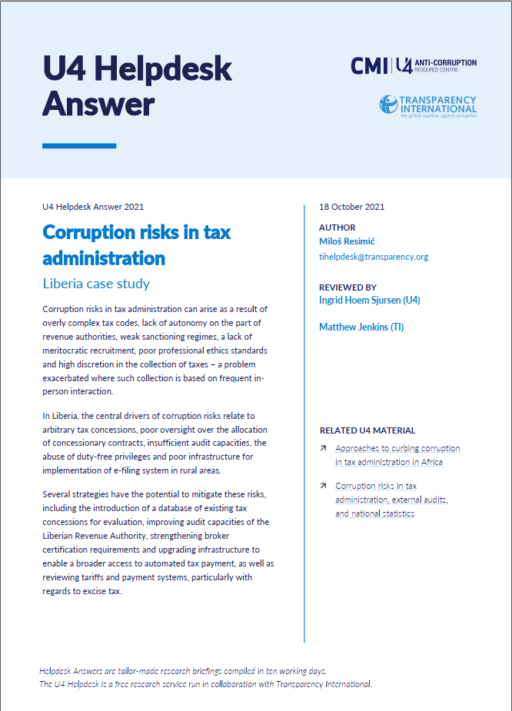
This Anti-Corruption Helpdesk brief was produced in response to a query from a U4 Partner Agency. The U4 Helpdesk is operated by Transparency International in collaboration with the U4 Anti-Corruption Resource Centre based at the Chr. Michelsen Institute.
Query
Please address the areas within tax administration with the greatest risk of corrupt behaviour and how could these risks be mitigated. We are particularly interested in examples from Liberia.
Summary
Corruption risks in tax administration can arise as a result of overly complex tax codes, lack of autonomy on the part of revenue authorities, weak sanctioning regimes, a lack of meritocratic recruitment, poor professional ethics standards and high discretion in the collection of taxes – a problem exacerbated where such collection is based on frequent in-person interaction.
In Liberia, the central drivers of corruption risks relate to arbitrary tax concessions, poor oversight over the allocation of concessionary contracts, insufficient audit capacities, the abuse of duty-free privileges and poor infrastructure for implementation of e-filing system in rural areas.
Several strategies have the potential to mitigate these risks, including the introduction of a database of existing tax concessions for evaluation, improving audit capacities of the Liberian Revenue Authority, strengthening broker certification requirements and upgrading infrastructure to enable a broader access to automated tax payment, as well as reviewing tariffs and payment systems, particularly with regards to excise tax.
Contents
- Background on corruption in tax administration
- Forms and drivers of corruption in tax administration
- Key forms of corruption in tax administration
- Key drivers of corruption risks in tax administration
- Corruption risks in tax administration in Liberia
- Background political and economic context and tax administration reform
- Key corruption risks in tax administration in Liberia
- Policymaking level
- Organisational resources
- Client interface
- Mitigation strategies
- General considerations
- Mitigating strategies in Liberia
Main points
- Corruption risks in tax administration can be assessed according to whether they occur at the policymaking, organisational resources or client interface stages (Trapnell et al. 2017).
- Key drivers of corruption risks in tax administration include overly complex tax regulations, a weak sanctioning regime, a lack of meritocratic recruitment, a lack of checks and balances, modes of tax collection based on frequent in-person interaction.
- In Liberia, key underlying drivers of corruption include arbitrary tax concessions, poor oversight over allocation of concessionary contracts, insufficient audit capacities, abuse of duty-free privileges, poor infrastructure for the implementation of their e-filing system.
- Potential mitigating strategies in Liberia include introducing a database of existing tax concessions for evaluation, improving audit capacities of the LRA, strengthening broker certification requirements, reviewing tariffs and payment systems, particularly with regards to excise tax, improving infrastructure to enable broader access to automated tax payment.
Authors
Miloš Resimić , [email protected]
Reviewers
Ingrid Hoem Sjursen (CMI) and Matthew Jenkins (TI)
Date
05/11/2021
Tags
 Download PDF
Download PDF
